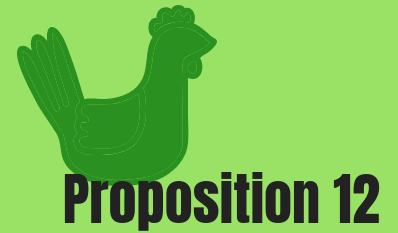Animal confinement regulations once again in the hands of California voters
After approving an animal confinement measure in 2008, voters must weigh in on a more specific animal confinement proposition

Proposition 12 sets new standards for confinement of pigs, veal calves and egg-laying hens and bans the sales of non-complying products.
November 5, 2018
Proposition 12, an animal welfare proposition that the voters of California will consider on the Nov. 6 midterm elections, can get confusing.
The Humane Society is driving the yes campaign and PETA is behind the no campaign.
Proposition 12 sets new standards for the confinement of pigs, veal calves and egg-laying hens and bans the sales of non-complying products.
In 2008, California voters approved Proposition 2, which said that the animals had to have space to turn around freely, lay down, stand up and fully extend their limbs. The law did not set measurement standards, though.
Commercial egg growers said this law did not require them to go cage-free when animal welfare activists said that it did.
California voters will once again weigh in on the issue.
Proposition 12 sets measurement standards, increasing the current space minimum of 8/10 of a foot per hen to a full foot effective in 2020 and requires cage-free housing by 2022.
This means farmers could still pack hens into buildings with anywhere between one to one and half square foot per hen, as long as they are not housed in cages.
Opposition to the proposition is being led by PETA. The organization said it doesn’t give the animals enough space and does not end caged housing fast enough. Proposition 12 doesn’t go far enough according to PETA, but does not point to an alternative.
The Humane Society says that it is unrealistic to expect the egg industry to change everything overnight. Banning the cages, even if it’s not until 2022, is a major win.









